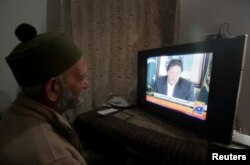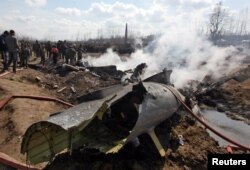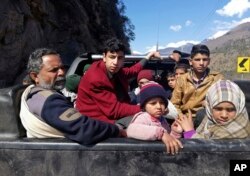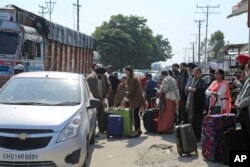Tensions escalated Wednesday between nuclear-armed rivals India and Pakistan amid claims and counter claims of shooting down each other's fighter planes.
Pakistan said it downed two Indian planes after they crossed over to its side of the Line of Control, the de-facto border in the disputed Kashmir region, following Pakistan's airstrikes into an "open space" on the Indian side designed to send a message. Pakistan said it captured one Indian pilot.
"We planned it such that there would be no collateral damage, no casualties, but only to let India know that if you can come into our territory, we can also carry out strikes on your territory," Pakistani Prime Minister Imran Khan said in an address to the nation Wednesday afternoon.
'Unprovoked act of aggression'
India said it shot down a Pakistani fighter plane, a claim denied by Islamabad, and New Delhi protested what it called Pakistan's "unprovoked act of aggression" in targeting Indian military posts and violating its air space. India acknowledged it lost a plane and the Indian pilot was with Pakistan.
"Pakistan would be well advised to ensure that no harm comes to the Indian defense personnel in its custody. India also expects his immediate and safe return," an Indian external affairs ministry statement read.
The Pakistani military's media wing released pictures of the wreckage and a video of the pilot who described himself as Wing Commander Abhinandan. India called the release of the video, and some leaked videos on social media, a violation of the Geneva Convention outlining the international rules of warfare.
Growing tension
Tension in the region has been steadily growing since a suicide attack earlier this month in Pulwama, in Indian Kashmir, that killed more than 40 security personnel. India accused Pakistan of sheltering the militant group Jaish e Mohammad that claimed the attack and promised a "befitting response."
Indian jets entered Pakistani airspace Tuesday, for the first time since 1971 when the two countries went to war, to destroy what they said were JeM's training camps near Balakot in Pakistan's Khyber Pakhtunkhwa province. Social media videos by locals from the area showed the strike hit a sparsely populated wooded area.
Prime Minister Khan had earlier warned that if India struck, Pakistan would be forced to respond. Analysts fear public pressure may force the two sides into a cycle of retaliation despite both claiming that they do not want the situation to escalate. The two sides have fought three full-scale wars along with a limited-scale conflict.
Khan offered India dialogue again Wednesday, promising to discuss all issues including terrorism.
"With the weapons (nuclear) that we own and you own, can we afford a miscalculation?" Khan said, addressing India, then adding, "If the situation escalates, it will be neither in my control nor Narendra Modi's control," he said, referring to India's prime minister.
Earlier in the morning, Indian Foreign Minister Sushma Swaraj told her Chinese and Russian counterparts that the Indian action was conducted in the light of the "continuing refusal of Pakistan to acknowledge and act against terror groups on its territory" but that her country would act with "responsibility and restraint."
The night before, the two sides exchanged heavy fire at several points in Kashmir. Gul Hasan, a teacher fleeing the shelling in Chakothi at the Line of Control on the Pakistani side, said he was forced to leave his home with his children in the middle of the night.
"People were running from Chakothi. We also ran on foot," he said, saying most of the population in the area also fled.
The two countries have had thousands of incidents of cross-border firing in Kashmir in the last few years.
Pakistan closed its airspace to commercial traffic Wednesday, restoring it only partially by the evening. India shut down airports in the north of the country for several hours but later resumed operations.
Calls for restraint
In light of Wednesday's developments, Chinese foreign ministry spokesman Lu Kang reiterated calls for India and Pakistan to exercise restraint.
The U.S. has also expressed concern about the situation.
"The United States is deeply concerned about rising tensions between India and Pakistan and calls on both sides to take immediate steps to de-escalate the situation. The potential risks associated with further military action by either side are unacceptably high for both countries, their neighbors, and the international community," a National Security Council official said.
A day earlier, U.S. Secretary of State Mike Pompeo said he had talked to both the Indian and Pakistani foreign ministers to "encourage India and Pakistan to exercise restraint, and avoid escalation at any cost."
Earlier this week, Federica Mogherini, the European Union's high representative for foreign affairs and security policy, talked to Pakistan's foreign minister, Shah Mahmood Qureshi, and "stressed the urgency to de-escalate the situation."
Meanwhile, peace activists in both countries have become active on social media. By Wednesday evening, #SayNoToWar was trending in both India and Pakistan.
Steve Herman contributed to this report.








